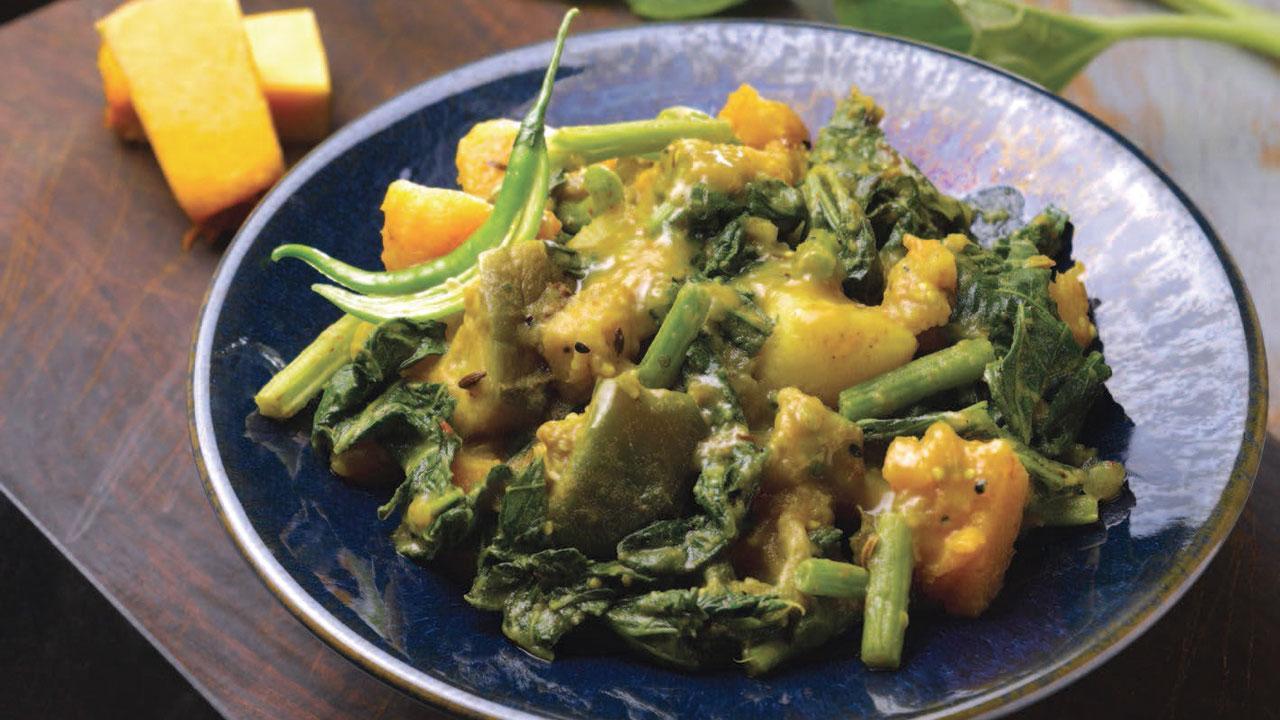A Bengali in Shillong, rich with family recipes passed down generations, writes a book for young cooks ready to plunge into the culinary game

Bengalis use chochchori (tender bottle gourd leaves) with different vegetables/fish and a mix of spices
Indranee Ghosh was 15 when she got interested in cooking. So much so, that she learned to prepare Bengali, Khasi and Nepali dishes, all around the same time. “This was in the 1960s and the 70s, when my mother, Lolita, would ask me to help her in the kitchen. An East Bengali, she would cook a lot of sweet meats and fish. I was by her side, on a stepstool, chopping veggies or stirring curries,” remembers Shillong-based Ghosh of her childhood. When her mother went away briefly to live with Ghosh’s sister in Delhi, the kitchen became her arena. “I was left with my grandmother, Charuhasini, and dad. And I think I managed pretty well.”
ADVERTISEMENT
Indranee Ghosh
Ghosh left Shillong after the formation of the hill state in 1972 to settle in Calcutta (now Kolkata) with her parents. But, she took Khasi recipes that she learned from her uncle, Bishwaketu. “My grandmother adopted a lot of Khasi children from the village, and educated them. They grew up with my mother and her sisters. One of them, however, remained with us right till the end and was never married. Bishwaketu uncle was a hunter, and loved fishing. Very often, he would bring home exotic meat. From him, I learned how to cook beef and pork.”
Stories of kitchen adventures are plenty in her kitty. “We used to get bamboo shoot and cook it with either meat or dried fish. One day, we thought of experimenting and mixed bamboo shoot and dried shrimp. It turned out well. Nothing unique, but definitely a very personal recipe,” she adds.
Ghosh’s new book, Spiced, Smoked, Pickled, Preserved: Recipes and Reminiscences from India’s Eastern Hills (Hachette India; R550], brings together charming vignettes from her youth in the densely forested Khasi Hills and then, Bengal’s plains. It features 75 recipes that represent a mix of Bengali, Khasi and Nepali cuisine. “Since I wrote the book for my daughter, I wanted to keep all the recipes simple, targeted at young cooks,” says Ghosh, whose translations of selected poems by Bengali poet Joy Goswami have been published by Worldview Books in India, and Whale and Star in the US.
Both flavours and ingredients, she feels, are quite similar in North Bengal, Darjeeling and Shillong. “In West Bengal, they don’t use as much garlic as we do in the hills. I don’t know whether that is related to the cold weather, but there is a slight difference in preparations. For instance, vinegar is used a lot in Khasi food. Khasi and Nepali cooks don’t use as many spices as Bengalis do. They usually depend on garlic, tomato, ginger and onion with frugal spices.”
Tales of family folklore from the time of the Second World War and memories of the Partition have also made it to the title. “My mother and her siblings grew up during the Second World War. There were some British soldiers who would visit my grandmother’s house. They would enjoy her cooking, and the spicy dishes she prepared for them.”
Food always took centre stage in family gatherings, and members discussed all the hard-learnt culinary techniques. Over time, forgotten dishes were reinvented—from fermented delicacies like shidol in pumpkin leaves to the sizzling pan-roasted telapiya; from the sweet-and-sour magic of fish roe ambal to a delicious tangerine payesh. “A few years before the Partition in 1947, my grandmother who had been stuck on the other side of the border, was brought back. Until that time, I don’t think we had cooked dried fish in the house. But once she returned, she changed that for us. So, we ended up learning newer ways of cooking Bengali food, most of which have made it to the book.”
Kosha telapiya (pan-roasted Indian tilapia)
Ingredients:
1 whole telapiya or large shor puti (swamp barb)
1/2 cup lime juice
Salt, to taste
2 tbsp onion paste
1 tbsp ginger paste
1/2 cup refined oil
1 to 2 tsp sugar
2 bay leaves
1/2 cup tomato puree
Method:
Score the fish on the sides and marinate in lime juice, salt, sugar, onion and ginger paste, and set aside for 30 minutes. In a large non-stick pan, heat the oil, add sugar and caramelise it. Add the bay leaves and garam masala and fry till they lose colour. Add the fish with the marinade, and sauté on high heat, basting it with tomato puree until it is brown and well coated with the spices. Transfer to a fat dish and carve into slices with a sharp knife. Serve with rice.
Fish stew
Ingredients:
500 gm white fish, preferably bhetki (barramundi)
Vinegar, as required to soak the fish
2 tbsp butter
1 tsp peppercorns
4 to 5 garlic cloves
2 medium-sized onions, sliced
2 cups chicken stock
1-inch piece ginger, grated
2 small potatoes, diced
2 carrots, diced
1/2 cup peas
1 handful of parsley or coriander leaves
1 tsp ground black pepper
Method:
Soak fish for 10 minutes in enough vinegar to cover the pieces. Then drain and set aside. This will get rid of the fishy smell. You could also use milk. Heat butter in a kadhai and fry the peppercorn, garlic and onion slices till light brown. Add the stock and bring to a boil. Add the ginger paste and the vegetables—potatoes first, and then the carrots and peas, else the carrots might overcook. Add the fish when the vegetables are almost done. Garnish with parsley or coriander leaves and season with pepper. Serve with fine-grain rice.
 Subscribe today by clicking the link and stay updated with the latest news!" Click here!
Subscribe today by clicking the link and stay updated with the latest news!" Click here!






